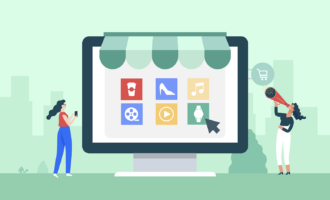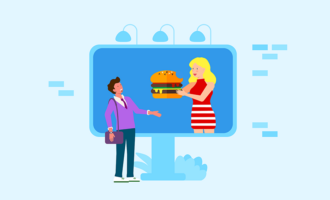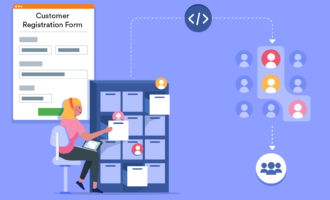Selling is selling, right? Not necessarily. Selling to another business is vastly different than selling to an individual consumer. Understanding the nuances of each is fundamental to effectively marketing your products or services in the B2B or B2C worlds.
For starters, it’s essential to grasp what motivates buyers in both cases. B2B and B2C buyers vary in their decision-making process, what information each deems valuable, and their value expectations. Let’s examine those variations.
What is B2B?
Business to business (B2B) is when one company sells products or services to another business. There are all kinds of B2B organizations across a large number of verticals. Companies sell and buy everything from tangible goods like office supplies and machinery to professional services and software that deliver assistance or solutions.
Some well-known B2B companies include LinkedIn, Oracle, and Cisco.
Pro Tip
Power your workflow with Jotform’s free online forms — perfect for both B2B and B2C business models.
What is B2C?
Business to consumer (B2C) is when one company sells products or services directly to an individual. Some famous B2C businesses include Amazon, McDonald’s, Nordstrom, and Netflix.
Many companies are both B2C and B2B businesses, which means they market products and services to both other organizations and to individuals.
Differences between B2B and B2C marketing
- Buyer motivation: Emotionally driven vs value driven
- Length of the buyer journey
- Complexity of the marketing effort
- Tone and messaging
- Relationship-building
Buyer motivation: Emotionally driven vs value driven
Length of the buyer journey
Complexity of the marketing effort
Tone and messaging
Relationship-building
If you’ve ever bought a pair of Nikes because you felt inspired by the idea that everyone can be an athlete, or made a beeline for McDonald’s because those golden arches have meant pure happiness for you since childhood, you’re one of the countless consumers who’s made a purchasing decision based on emotion.
This kind of appeal is what primarily motivates individuals to get out their wallets or hit the “checkout” button. Accordingly, B2C marketing is largely focused on the human side of selling, with marketers wooing potential customers to favor their brand and its product/service.
On the flip side, B2B marketing is all about defining value for revenue-focused businesses that prioritize growth and profitability. Decision makers focus on ROI (return on investment) from the purchase. Their motivation for making a purchase is far more rational that an impulsive consumer buying a pair of shoes or sunglasses. Unlike emotionally driven B2C marketing, B2B marketing makes logical arguments for the functional benefits of a product based on performance and economics.
The buyer’s journey begins when the potential purchaser first hears of a product or service, decides it’s worthwhile to learn more about it, and compares it with the offerings of competing companies before deciding to purchase.
Unsurprisingly, the data-driven decision-making process normal for businesses making significant purchases takes longer than a consumer considering a purchase because they have a coupon or saw the item recently on a celebrity’s Instagram.
B2B sales typically involve varied stakeholders who need to be persuaded before a purchase is approved. Someone from the IT department may have technical concerns, whereas someone from the finance department scrutinizes the cost. Many companies have a formal evaluation process.
Regardless of who’s involved, B2B marketers need to convince each stakeholder that the value of the purchase will make it worth the price. This takes time, and trying to hurry the process is seldom helpful. Successful B2B marketers are patient and align their expectations with this reality.
B2B marketing efforts are significantly more complex than B2C marketing efforts. B2B marketing requires more face-to-face interaction with customers, often in a series of formal meetings over weeks or months.
Decision makers will demand more information from B2B marketers at each stage of the marketing funnel — from awareness to consideration to conversion. The material provided to B2B customers often needs to be customized to address the highly individualized concerns of each person on the decision-making team.
On the flip side, B2C marketing offers mass-produced products and standardized services to prospective customers seeking just enough information to make their on-the-spot decision. Accordingly, B2C businesses prioritize competitive pricing and strong customer service.
Marketing is what you say, how you say it, and to whom you say it. There are key differences in how B2C and B2B marketers talk to potential buyers and how those potential buyers talk to them.
Businesses that want to learn how an offering solves a problem or addresses a particular pain point will generally ask more complex questions than a typical consumer. According to the 2019 Content Preferences Survey Report, it’s likely that B2B customers will do research before talking with a sales rep, so B2B marketing materials need to be more detailed and speak to a higher degree of expertise than a general audience would expect. Effective B2B content is comprehensive and precise.
B2C messaging, on the other hand, is generally simple and to the point. Your goal is positive messaging about your brand that’s embraced and shared by individuals.
If a B2C customer is disappointed by their purchase, they return it. There is far more at stake for a B2B sale gone wrong. The person responsible for purchasing your product or service could lose their job. The company that spent thousands of dollars buying from you is out the cash, not to mention the time and effort they will have to reinvest to find a solution to replace yours.
B2C marketers seldom have direct contact with individual consumers, but B2B marketers only succeed by building trust and credibility, on a personal level, with decision makers. Successful B2B marketing strategy is a collaboration with sales and support staff to create strong connections with prospective and current customers. Continuous relationship building is essential because of the subscriptions, licenses, and long-term contracts that are integral to B2B transactions.
B2C marketers, on the other hand, can focus more on brand building in mass markets of consumers looking to make a quick and convenient one-time purchase.
Different challenges
B2B marketing isn’t more difficult than B2C marketing, but it does require a different approach. The nature of the B2B audience and sales cycle demands patience. However, if you work hard to fully understand the businesses you’re selling to, the motivations of the stakeholders, and what you need to do to close the deal, all that time and effort will pay off in big bucks.









































































Send Comment:
1 Comments:
More than a year ago
Great blog Anthony!! It clearly helps to understand the difference between B2B and B2C marketing strategies. Even at Branding Marketing Agency also I was just clear about B2B marketing strategy.
Thank you.